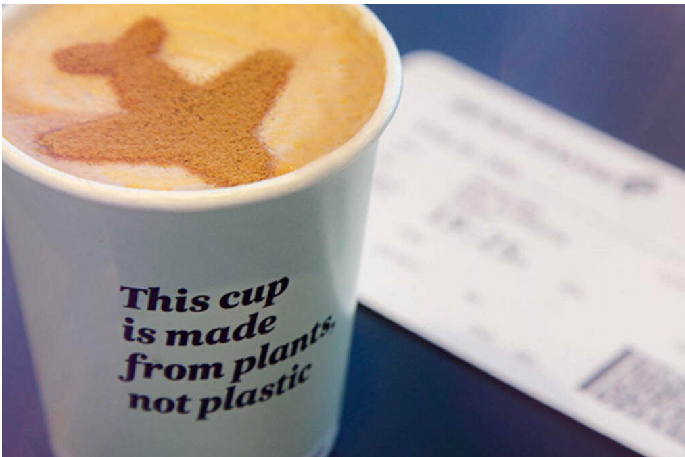Consumer NZ is concerned New Zealand’s national carrier could be taking us for a ride, in more ways than one.
“We think the messaging on Air New Zealand’s in-flight cups is another example of greenwashing,” says consumer investigative team leader Rebecca Styles.
The cups proudly state ‘made from plants, not plastic’.
“While the cups are made from plants – with a bioplastic lining – we think the message creates an impression the cup has less impact on the planet than a standard cup,” says Rebecca.
The airline acknowledges the claim could lead to an impression that the cups will be disposed of sustainably, which may not be the case.
The Air New Zealand cup can be composted in commercial facilities, but New Zealand has a limited number of industrial composting facilities.
In this instance, due to the lack of composting facilities in New Zealand, this cup is likely to have a similar environmental impact as a standard single-use cup – but that’s not the impression Air New Zealand is creating with its marketing.
“Air New Zealand told us that only cups from incoming Auckland domestic flights are composted,” says Rebecca
At a practical level, this means unless the cup is on a flight landing at Auckland Airport, due to the lack of industrial composting facilities in New Zealand, it will likely end up in landfill.
“Although these cups are compostable, if they’re chucked into landfill, they are unlikely to break down quickly.”
While Consumer encourages businesses to innovate and increase their focus on sustainability, it is concerned New Zealanders are currently being duped by green claims.
“Our advice to businesses making green claims is to consider the impression their claims will create in peoples’ minds.
“It’s not okay to say that a product is ‘green’ or ‘sustainable’ if it can’t live up to that claim,” says Rebecca
“We need new regulations to tackle ‘green’ claims.”
Greenwashing refers to deceptive or misleading marketing practices used by companies or organisations to make their products, services, or practices appear more environmentally friendly or sustainable than they are.
Consumer is calling for new regulations to tackle dubious green claims.
“Our recent investigations have found that there’s no shortage of products spouting environmental claims.
“We have found that many of these ‘green’ claims are meaningless.”
“We are concerned that well-meaning consumers are being led to believe products are more sustainable than they are.
“One of the issues with greenwashing is it can be near impossible for a shopper to identify what is genuinely sustainable, and what is not,” says Rebecca
Regulators in the EU, UK, and Australia have found that 40-50 per cent of environmental claims in industries like clothing, cosmetics, food and drinks are false. New laws are now being implemented overseas to stop this.
“We are seriously lagging behind our international counterparts.”
In New Zealand, the Commerce Commission is responsible for policing false claims but generally relies on shoppers to report them. It shouldn’t be up to consumers to keep companies honest.
“We want New Zealanders to join our call for an independent investigation into greenwashing claims in New Zealand, and new regulations to tackle greenwashing,” says Rebecca.
“Together we can put an end to this deception.”



